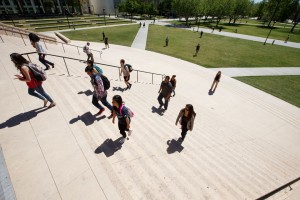CSUN’s Model United Nations Team Sweeps at National Competition

CSSUN’s Model United Nations (MUN) team brought home top honors from the National MUN Conference. Photo by Lee Choo.
California State University, Northridge’s Model United Nations (MUN) team outpaced universities from across the country at the National MUN Conference in early November in Washington, D.C., bringing home top awards.
Representing Angola, the CSUN team of 10 students won the overall title of Outstanding Delegation, and several individuals were honored for their position papers and speeches.
CSUN political science professor and MUN adviser Jennifer De Maio said the honors were well deserved and reflected the students’ ability to succeed and foster important communication and persuasion skills.
“I am so proud of them,” she said. “To see their effort pay off and their dedication result in recognition at a national level makes me aware of the quality and caliber of the students we have here at CSUN.”
Head delegates and William Pond, political science, and Eric Martinez, biology, agreed that the MUN experience allowed them to grow as a team and individually.
Martinez said the team became a central part of his experience as a CSUN student.
“It becomes your life and a defining moment in your college experience,” he said. “It is a once-in-a-lifetime experience that I will [remember] for the rest of my life. People should take a lot of pride in what is offered at CSUN. We have a good reputation for our delegation, and having that background is critical.”
“The best part of the program is watching the students grow and discover themselves,” Pond added. “[We] won in our [competition], but getting to watch other [team members] have that moment when they understand their own ability is amazing. They gained a confidence that only winning something like a national title can give.”
Pond, who is graduating this fall, said that without the MUN team, his passion for his political science studies would have waned.
“I started feeling senioritis,” he said. “[Winning] was the proudest moment for me at CSUN. It reignited my passion for the school.”
MUN provides an experiential learning experience where students can use what they learn in the classroom and put it into practice, De Maio said.
“Experiential programs take what they are learning and actually apply it,” she said. “It really builds those communication skills that they will use after they graduate.”

 experience
experience